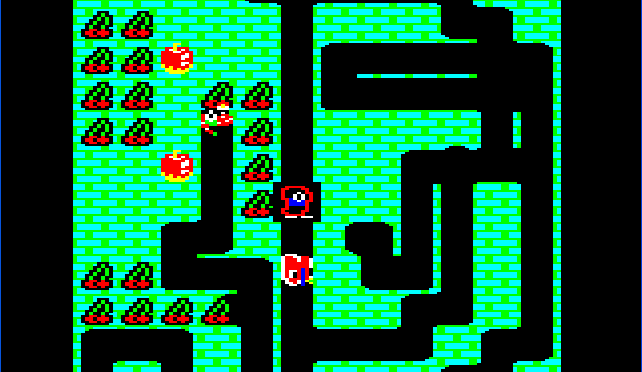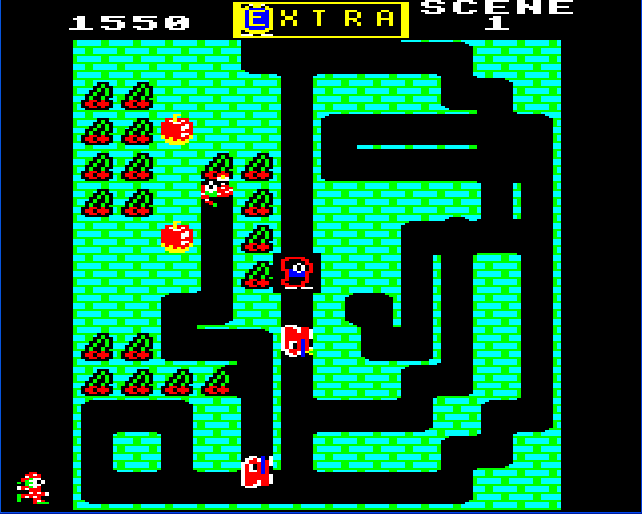Introducing a pixel perfect clone of Mr Do!
Mr Ee! came from a time when copyright law didn’t seem to apply to video games, otherwise this game would never have existed. Imagine taking the latest Super Mario game on the wii, copying it, calling it Super Dave and releasing it on the XBOX. That’s what Micro Power did with Mr Ee! on the BBC Micro, a blatant copy of The Mr Do! arcade game.

Mr Ee! : Not just another arcade clone
But there are plenty of blatant rip offs out there in video game history, and this is not the reason why Mr Ee needs to be celebrated. What it did, it did brilliantly, providing an almost arcade perfect copy of the original. The computer that made it possible was the BBC Micro, a home computer whose primary purpose was teaching IT in schools.

On seeing Mr Ee! playing on my friend’s BBC Model B computer, a kind of cross between Pac Man and Dig Dug, I knew I had to have one. Everything from the full colour graphics to the lively (if repetitive) music, shouted quality, and to me it looked and played just like the game I had played in the arcades. It was the first time that I realised that commercial quality gaming was possible on a personal machine. It is no suprise to read interviews with Adrian Stephens (the programmer behind the game) had spent hours playing the game in the arcades and had wanted to recreate that feel.
How to play Mr Ee!
Mr Ee! has unusually rich gameplay for an early arcade game conversion, with multiple game mechanics that must be mastered in order to progress.
Firstly, you have the ability to collect cherries to score points, which rack up with multipliers when you collect them in sequence. There are also monsters to avoid, which can be killed with a ball you can fire (one at a time), and bounces off the walls of the tunnels until it destroys and enemy or returns to you.
Then there are apples, which unlike cherries cannot be collected, but you can dig underneath them so they fall and crush anything (including you) in their path. Be careful as some monsters can also push apples off of ledges to try and kill you. The monsters, collectively known as creeps, are broken down into:
- Regular Red Creeps, that look like dinosaurs and can only travel along existing tunnels
- Diggers, which are purple dinosaurs that can dig their own tunnels
- Alpha monsters, that are containers with letters inside them spelling out the word EXTRA, get all for an extra life. They can also eat apples!
Unlike PacMan where there was only one way to clear the screen and move to the next level, there were actually 4 ways to progress in Mr Do! / 2 in Mr Ee!
- Collect the Cherries – Easy to do on the early levels but very low scoring. On higher levels it is a good last resort if you are under pressure from enemies and there are only a few cherries left to collect.
- Kill all monsters – Even if there are munchers and alpha monsters on the screen the level will end when you kill the last regular monster or digger. This is helpful when you are score chasing and get overwhelmed with multiple monsters.
- Get the Extra (Mr Do! Only) – Kill the alpha monster highlighted in the “extra box” at the top of the screen and the level will end immediately
- Get the Diamond (Mr Do! Only) – A diamond will appear at random from an apple that has fallen and cracked open. Get it quick to end the level.

Mr Ee! Remembered
Mr Ee goes back to a time when one programmer, part game fan / part self taught coder, could produce a commercial quality game at home and it become a huge hit, selling in thousands. Today this is just not possible, not even in the world of teenagers selling games through the app store. In this open market space a popular game will need programmers, artists, musicians, marketing teams and serious money in order to compete with the thousands of quality games available.
So hats off to the BBC and their indirect promotion of blatant plagiarism for the sake of the 80’s gaming public – it will never happen again.

